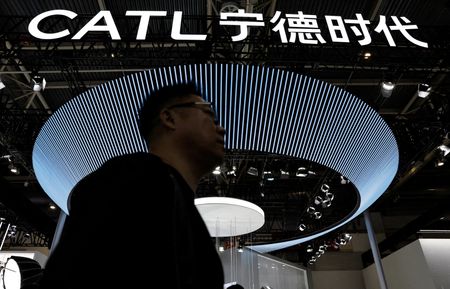BEIJING (Reuters) – China’s factory activity slowed at the start of the second quarter, with a sharp fall in new export orders and the resumption of employment declines, a private-sector survey showed on Wednesday.
The survey shows U.S. tariffs beginning to ripple through to China’s sprawling manufacturing industry as Beijing holds off on fresh stimulus, biding its time in what it expects to be a protracted trade war.
The Caixin/S&P Global manufacturing PMI slipped to 50.4 in April from 51.2 in March, beating analysts’ expectations in a Reuters poll but marking the lowest reading since January. The 50-mark separates growth from contraction.
The result contrasts with China’s official PMI released on Wednesday that showed factory activity falling faster than expected in April.
“The ripple effects of the ongoing China-U.S. tariff standoff will gradually be felt in the second and third quarters,” said Wang Zhe, economist at Caixin Insight Group.
“Policymakers should be well-prepared, with action taken sooner rather than later.”
According to the survey, the rate of contraction in new export orders was the sharpest since July 2023. This also led to a slower and only marginal rise in total new orders.
Output, however, continued to expand, though at a slower pace, as factories worked through both new and existing orders.
Firms lowered their inventories as business optimism slipped to the third-lowest since this series began in April 2012, due to the trade uncertainty.
Trade disruptions and supply constraints resulted in a slight lengthening of supplier lead times in April. Greater competition among vendors amid subdued demand for inputs led to another drop in average input costs.
After rising in March, employment in the manufacturing sector declined in April, due to both resignations and company restructuring plans out of downsizing and cost-cutting efforts.
Former Premier Li Keqiang in 2020 had said the country’s foreign trade sector, directly or indirectly, supported 180 million people’s jobs.
At last week’s Politburo meeting, top leaders pledged to support firms and workers most affected by the impact of triple-digit U.S. tariffs. Officials from multiple economic departments on Monday tried to assuage concerns the U.S. tariffs could derail efforts to shore up a fragile economic recovery.
The government has promised to support exporters who try to shift their sales to the domestic market, but some exporters were reluctant to heed the calls, citing weak domestic demand, price wars, low profits, payment delays and high product return rates in the domestic market.
(Reporting by Ellen Zhang and Ryan Woo; Editing by Sam Holmes)









